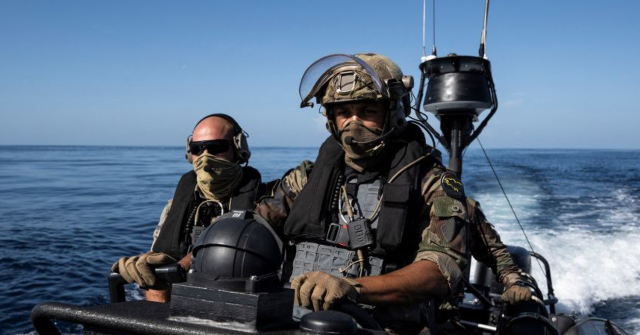The government of France announced a substantial investment in law enforcement and military activities in the Caribbean on Sunday, including the deployment of two nautical brigades and a slew of surveillance drones and radar resources, to fight an explosion in drug trafficking in the region.
France is a Caribbean country by way of preserving several territories in the sea. Paris sent its Minister of the Interior Bruno Retailleau to the island of Guadeloupe this weekend, part of a greater tour of the region that began on August 21, to address what French officials described as an eruption in violent crime tied to a growing volume of drug trafficking in the sea. The French announcement followed multiple reports of an increase in U.S. Navy activity in the southern Caribbean intended to curb cocaine trafficking linked to the socialist government of Venezuela, which the administration of President Donald Trump describes not as a legitimate state entity, but a narco-terrorist syndicate.
The Venezuelan government is deeply tied to cocaine trafficking through the Cartel de los Soles (“Cartel of the Suns”), an intercontinental drug-trafficking operation run through the apparatus of the Venezuela armed forces. The cartel is named for the sun medallions that Venezuelan soldiers wear on their uniforms. Organized crime experts and American government officials believe that the cartel is run by dictator Nicolás Maduro and top henchmen Diodado Cabello, the current minister of the interior, and Vladimir Padrino López, the minister of defense.
A 2023 report by the Miami Herald estimated that the Cartel de los Soles was trafficking over 350 metric tons of cocaine a year, valued at the time as worth between $6.2 billion and $8.7 billion.
The Maduro regime has enthusiastically rejected all evidence of its drug trafficking operations and its links to other nefarious terror groups such as the Revolutionary Armed Forces of Colombia (FARC), a communist narco-terrorist gang, and the jihadist group Hezbollah. Maduro appeared on state television last week condemning the U.S. for deploying assets to fight drug trafficking, calling the drug problem an excuse to launch a ground invasion of Venezuela, and began operations to recruit soldiers to prepare for an alleged planned U.S. invasion.
According to the French newspaper Le Monde, Interior Minister Retailleau noted in his visit to Guadeloupe that the island has seen a dramatic increase in firearm homicides and drug-related crime. France will deploy 13 new investigators to help solve those cases, he announced, in addition to the military assets. Le Monde listed those assets as “two nautical brigades and the arrival of radars and drones to monitor the coasts of the archipelago.”
“Customs is increasing seizures ranging from a few grams to several tonnes, which arrive by sea — and port — or by airport,” the newspaper noted, citing Retailleau. The French government issued a separate statement confirming the urgency of deploying more reinforcements to fight drug crime in the region, stating, “these massive measures send a clear message to traffickers: they will discover they have before them a France that never retreats before violence.”
International experts have highlighted cocaine production as a particular problem in global drug trafficking. The United Nations Office on Drugs and Crime (UNODC) published a report in June finding that cocaine production, which mostly occurs in Colombia, reached record-high levels in 2023, the last year for which data is available. The explosion in cocaine production and trafficking immediately followed the election of Gustavo Petro, Colombia’s first-ever socialist president, who largely halted all national-level anti-drug operations and replaced them with a failed “total peace” program to integrate drug traffickers into society. Petro’s administration has also tolerated a dramatic growth in FARC activity, including mass casualty terrorist attacks.
Petro has enthusiastically supported the Maduro regime, going so far as to declare on Monday that the Cartel de los Soles “does not exist.” The Colombian president was responding with outrage to American military action to contain drug crime in the Caribbean.
Reports began surfacing a week ago that the U.S. military would deploy to the region three Aegis guided-missile destroyers and “about 4,000 sailors and Marines,” according to Reuters. The reported deployment is occurring a month after Secretary of the Treasury Scott Bessent announced the United States was adding Cartel del los Soles to its list of Specially Designated Global Terrorist (SDGT) entities.
“Today’s action further exposes the illegitimate Maduro regime’s facilitation of narco-terrorism through terrorist groups like Cartel de los Soles,” Bessent said in a statement on July 25. “The Treasury Department will continue to execute on President Trump’s pledge to put America First by cracking down on violent organizations including Tren de Aragua, the Sinaloa Cartel, and their facilitators, like Cartel de los Soles.”
The governments of Paraguay and Ecuador similarly designated the Cartel de los Soles a terrorist organization shortly after the Treasury’s action.
“What I will say with respect to Venezuela, President Trump has been very clear and consistent. He’s prepared to use every element of American power to stop drugs from flooding into our country and to bring those responsible to justice,” Press Secretary Karoline Leavitt told reporters last week, responding to reporters’ questions about the military deployment to the Caribbean. “The Maduro regime is not the legitimate government of Venezuela. It is a narco-terror cartel.”
Maduro responded by flooding social media with propaganda claiming that America’s anti-drug operations were meant to stage a coup to oust his regime and that the Venezuelan military was prepared to take down the U.S. Many of these videos featured Venezuelan soldiers performing apparent martial arts displays to intimidate American soldiers.
Maduro held nationwide military recruitment drives over the weekend in an attempt to galvanize civilian young men to join informal “militias” to fight the United States. Reports on the ground in Venezuela indicate the events were highly unpopular, however, attracting little interest.
Follow Frances Martel on Facebook and Twitter.
Read the full article here



